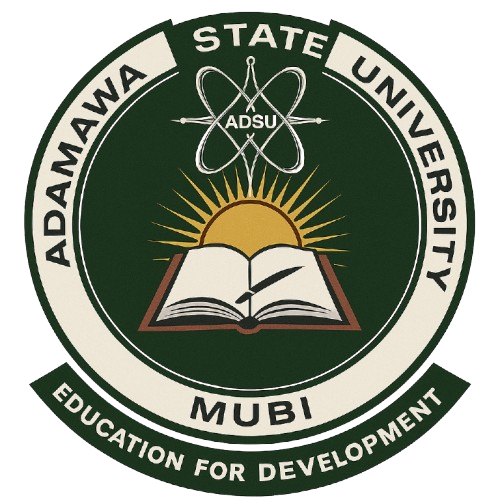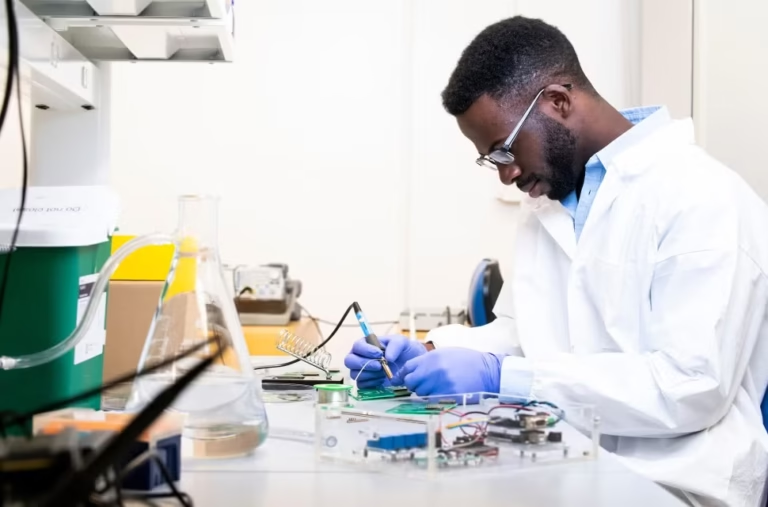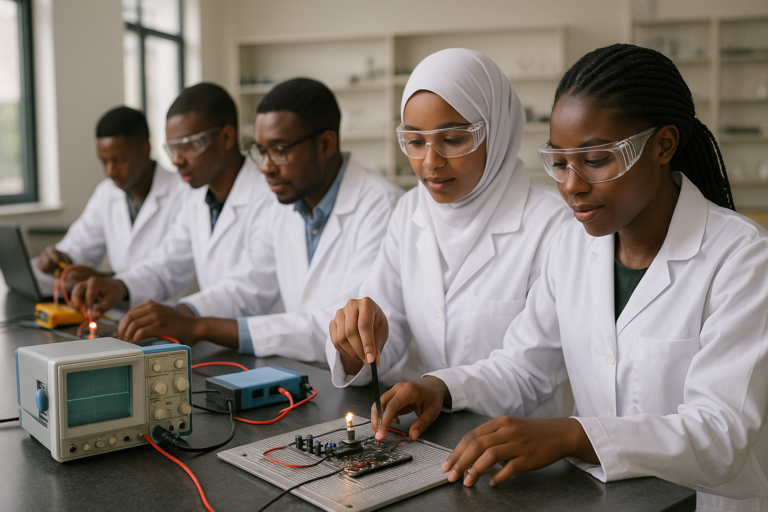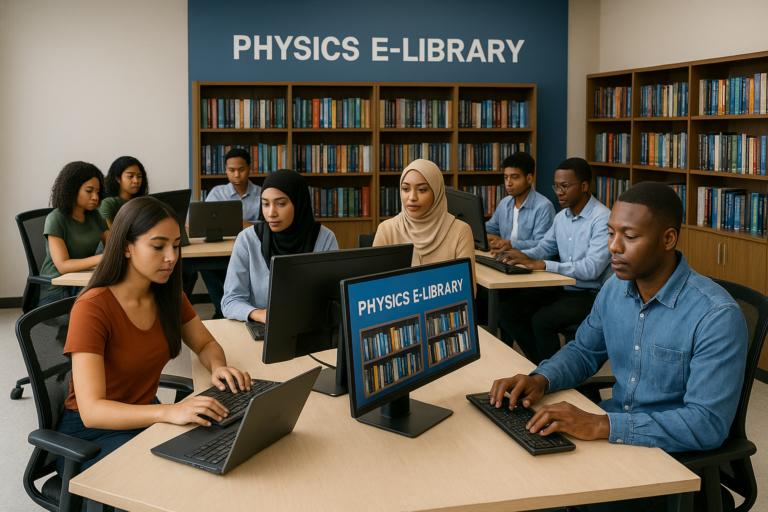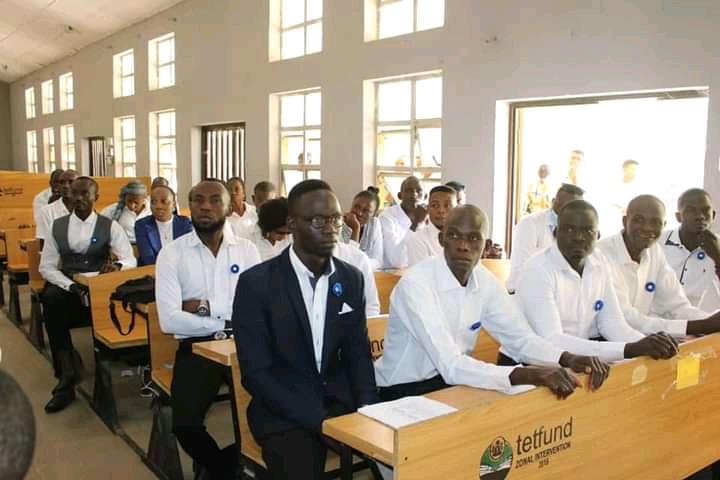Page Pure & Applied Physics

Welcome Message from the Head of Department
Dear Students, Scholars, and Visitors, It is my pleasure to welcome you to the Department of Pure & Applied Physics. We take pride in being a hub for scientific inquiry, critical thinking, and innovation. Our programs are tailored to provide students with a robust foundation in physics while encouraging specialization in cutting-edge areas such as energy, electronics, and applied geophysics. We look forward to supporting your academic journey and inspiring your future in science and technology. — HOD, Department of Pure & Applied Physics
HOD, Department of Pure & Applied Physics
About the Department
Exploring Nature, Powering Innovation.
The Department of Pure and Applied Physics, Adamawa State University, Mubi was established in October 2002 as one of the pioneer departments of the university. The department has excellent scientific pedigree, and direction arising from the quality of the Department’s founding staff. The Department offers a B.Sc. program in Physics. It started running the program in the 2002/2003 academic session with initial staff strength of five academic staff, and five students. The department is currently staffed with an array of highly
experienced academics and professionals, in addition to other young upcoming talented stars at varying stages of the academic/ professional ladder. Furthermore, the department serves other departments/faculties in the University.
Programmes Offered
Undergraduate Programme
PROGRAMS AND SUBPROGRAMS
The department trains students to graduate with a Bachelor of Science (B.Sc.) degree in Physics and is designed to provide a basic foundation of Physics in the first and second year through courses covering classical physics, electricity and magnetism, waves and optics, dynamics, thermodynamics, modern physics, computer literacy, and special theory of relativity, as well as underlining mathematical concepts that underpin a better understanding of the courses. The scope of energy and environment as well as weather and space science had been widened in line with the global concern on sustainable development. A new course on workshop practice was introduced to provide the students with a flavour of engineering design and electronic instrumentation.
The third-year courses of the program build on the basic foundations and cover the transition. between classical and quantum physics including electromagnetic waves, electromagnetism, statistical physics, and the student industrial work experience scheme design to complement the theory learned in the classroom and practical applications and experience of the industries. The diverse topics covered as taught courses will be complemented during each year by a laboratory. Practicals that enable the students to understand and appreciate the principles, theorems, and laws in physics.
The fourth-year courses of the program are designed to provide further mathematical knowledge that buttress the applications of quantum mechanics, nuclear physics, and special mathematical. Functions in physics. A range of diverse modern courses have been introduced to enable the Students choose from various fields of specialization in physics as well as to carry out a scientific research project.
Philosophy
The philosophy of the program is to provide a supportive learning environment for the training of students in both theoretical knowledge and experimental skills in physics, ready and capable for further academic pursuit, research, or work in all relevant fields for human development. Graduation Requirements Candidates admitted into the 100 level of the 4-year program are required to pass a minimum of 120 prescribed credits (comprising of the faculty courses MTH 101, 102, and COS 101 and all core courses) to be eligible for graduation while candidates admitted into the 100 level of the 5-year program are required to pass a minimum of 150 prescribed credits. Direct entry Candidates admitted into the 200 level of the 4-year program are required to pass a minimum of 90 prescribed credits to be eligible for graduation. Candidates admitted into the 200 level of the 5-year program are required to pass a minimum of 120 credits before graduation.
Resources and Facilities
PROGRAMS AND SUBPROGRAMS
INTRODUCTION
Department of Physics is one of the foundation departments that started operating in February 2002. The Department of Pure and Applied Physics runs a degree program at the undergraduate and postgraduate levels. The Department is well equipped with modern facilities (in terms of equipment) required for meaningful research activities in almost all areas of physics. The Department has qualified experts in various physics disciplines with a known high reputation for excellence in teaching and research. With the increase in staff strength and qualification, it became necessary to mount a Postgraduate program to cater to the diverse areas and interests of not only the staff of the Department who needed to pursue higher degrees but also other graduates who are qualified so as to maximize the usages of available laboratory and research facilities.
PHILOSOPHY
The postgraduate diploma course is designed to meet the needs of candidates with a Third Class Degree, HND who may wish to enhance their theoretical backgrounds and prepare themselves for sound, virile, and balance training, necessary for the development of creative thinking and research abilities. The M.Sc and M.Phil. program is designed to meet the needs of producing graduates well grounded in advanced experimental and applied physics to fit them into Research positions.
The program is intended to foster professionalism in the theory and practical aspects of physics as an integral part of a scientific and technological society. For a Ph.D. program, rigorous training is required for a person whose interest is to acquire a PhD Degree. This happens to be the highest degree that most Universities award. A candidate is therefore expected to earn the PhD by dint of thorough independent research that must be adjudged to be of high standard in one particular area of specialization. It is also expected that after earning the PhD degree, the candidate becomes a career research scientist thus proving the traditional characteristic of the Department of Pure and Applied Physics, Adamawa State University, Mubi. The single purpose philosophy of the PhD program in Applied Physics of ADSU is to instill deep-rooted instructions, by way of training, to young physicists. The result will be a realization of competent physicists who would become proficient in providing expertise to other branches of science and technology. It will also produce an advantage of staff development for cost-effectiveness.
OBJECTIVES:
The objectives of the postgraduate diploma program are
- To serve as a link for smooth transition, for candidates with first degrees in other related courses, HND, or other equivalent qualifications.
- To train applied physicists, who can fit well into industries, research institutes and numerous educational institutions at ordinary and advanced levels.
- To train physicists (with Third Class) wishing to pursue higher degrees in any area of physics of applied physics.
- To strengthen students’ undergraduate physics knowledge and enhance their ability to apply physics concepts to problems.
- The objectives at the M.Sc. levels are:
To expose candidates to a broad perspective of physics and to offer detailed knowledge in the area of specialization. - To expose candidates to the latest techniques and methods in physics depending on the area of specialization.
The main objectives of the M.Phil. program are: - To admit a candidate in exceptional circumstances where the CGPA in the
Masters degree is lower than the minimum required B (60%) average or 4.00 on
a 5-point scale. - To admit candidates interested in pursuing Ph.D. programs in
fields different from, but relevant to that in which they obtained their Masters
degree. - To obtain a terminal M.Phil. degree award if the candidate fails to make the
minimum requirement to transition to the Ph.D. program. - To expose candidates to a broad perspective of physics and to offer detailed
knowledge in the area of specialization. - To expose candidates to the latest techniques and methods in physics depending
on the area of specialization.
The objectives at Ph.D. levels are:
To expose candidates to a broad perspective of physics and to offer detailed
knowledge in the area of specialization.
To expose candidates to the latest techniques and methods in physics depending
on the area of specialization.
ENTRY REQUIREMENT:
The entry requirement for the postgraduate diploma program will be as follows:
- Candidates must have five credit passes including English, Mathematics,
Physics, and two other relevant science subjects at ‘O’ Level. - Holders of Higher National Diploma (HND), with a minimum of Upper Credit,
in physics or related courses. - Candidates with B. Sc. (Hon.), B. Tech. (Hon.), and must obtain a minimum
Pass Degree. - Equivalent qualification(s) to (ii) and (iii) above.
The following shall qualify for the Masters Degree admission: - Candidates must have five credit passes including English, Mathematics,
Physics, and two other relevant science subjects at ‘O’ Level. - Graduates of Adamawa State University or other recognized Universities who
have obtained the approved degree of Bachelor of Science with at least Second
Class lower in either Physics or the following disciplines: Electronics,
Atmospheric Physics, Computer Science, Electrical Engineering, or any other
related fields. - Candidates whose degrees are unclassified with an average of ‘C’ (50%) or
above. - Candidates with a third-class degree and five years of working experience.
Candidates who hold qualifications other than the ones listed above which are
acceptable to the board of postgraduate school to pass an examination set by the
Department to determine their suitability for postgraduate work. - Candidates for M.Phil. The program must satisfy the following conditions:
- Candidates must have five credit passes including English, Mathematics,
Physics, and two other relevant science subjects at ‘O’ Level. - Graduates of Adamawa State University or other recognized Universities who
have obtained the approved degree of Bachelor of Science with at least Second
Class lower in either Physics or the following disciplines: Atmospheric Physics,
Energy Physics, Electronics/Communication, or any other related fields. - Candidates must have a Masters degree in the relevant area of specialization
from the Adamawa State University or any other recognized institution with a
CGPA above 2.8 /5.0.
Candidates must demonstrate adequate intellectual capacity, maturity, and
effective decision-making and problem-solving potential.
Candidates for Ph.D. Programs must satisfy the following conditions: - Candidates must have five credit passes including English, Mathematics,
Physics, and two other relevant science subjects at ‘O’ Level. - Graduates of Adamawa State University or other recognized Universities who
have obtained the approved degree of Bachelor of Science with at least Second
Class lower in either Physics or the following disciplines: Electronics,
Atmospheric Physics, Computer Science, Electrical Engineering, or any other
related fields.
Candidates must have a Masters/ M.Phil. degree in the relevant area of
specialization from the Adamawa State University or any other recognized
institution with a CGPA of 3.5/5.0.
Candidates must demonstrate adequate intellectual capacity, maturity, and
effective decision-making and problem-solving potential.
MODE OF STUDY:
For a Postgraduate diploma, a student must fulfill the following conditions:
- Pass a minimum of 28 credit units; made up of 15 credit units in core courses,
9 units in elective courses, and 4 units of a Research project.
Defend his/her project successfully
Obtain a minimum CGPA of 3.0
For the M.Sc. program, the following shall occur: - The study shall be carried out by coursework to be examined in written
papers
together with research to be presented in a project form or report. - A minimum of 30 credits shall be registered at the Masters level; Core courses
of 24 credit units, including the general courses, projects, and seminars while elective
courses of 6 credit units shall be taken. - Student shall present at least one Seminar, submit and defend a dissertation
proposal; and shall carry out research in a relevant area of specialization, and submit
an acceptable dissertation which must be defended before a panel of internal and
external examiners.
For the M.Phil. program the following shall occur: - The candidate will be attached to one of the research groups of the department
for his/her thesis work. The candidate will be assigned to two supervisors.
The study shall be carried out by M.Sc. coursework to be examined in written
papers together with research to be presented in a project form or report. - A minimum of 18 credits of M.Sc. courses shall be registered, 8 of which shall
be by written examinations and the other 10 by dissertation and seminar.
Students shall present Two Seminars, submit and defend a dissertation proposal;
and shall carry out research in a relevant area of specialization, and submit an acceptable Thesis which must be defended before a panel of internal examiners.
The candidate will finally be upgraded to a Ph.D. Status after obtaining a CGPA
of 4.0/5.0
The following requirements are specific to the Ph.D. program: - The candidate will be attached to one of the research groups of the
department for his/her Thesis work. - The candidate will be assigned to two
supervisors. - The candidate will be offered a series of relevant courses from the department
up to a maximum of 12 credit units per session. The candidate shall also
register 12 credit units for the seminar and thesis. - The candidate shall submit to the Departmental Postgraduate Board (through
his/her supervisors) an outline of his proposed research work for consideration
and approval before the commencement of research projects. - The candidate
is also required to give the first seminar on the proposal. - The Ph.D. candidate shall give a detailed report of the work done and a second
seminar for upgrading the candidate to the Ph.D. status. - The Ph.D. candidate on completion of his/her thesis must give a final seminar
before he/she defends his/her thesis before the external examiner as specified
by the University Postgraduate Board.
6.0
DURATION OF THE PROGRAMME:
- The postgraduate diploma program shall run for a minimum of 12 and a maximum of
24 calendar months for full-time students and a minimum of 24 and a maximum of 36
calendar months for part-time students. - The degree of Masters shall last for a minimum of 24 and a maximum of 36 calendar
months for full-time students and a minimum of 36 to 48 calendar months for Part
time students. - The M.Phil. program shall run for a minimum of 12 and a maximum of 24 calendar
months. - The Doctoral program shall run for a minimum of 36 and a maximum of 48 calendar months full-time. The Part-time Doctoral program shall run for a minimum of 48 and a maximum of 60 calendar months.
AREAS OF SPECIALISATION:
There are Four research areas at present for M.Sc., M.Phil., and Ph.D. levels:
- Applied Geophysics
- Atmospheric Physics
- Electronics/Communication Energy Studies
PUBLICATIONS:
All M.Sc and Ph.D students must publish their work before graduation. PGD and
M.Phil. are exempted here.
M.Sc. to publish one(1) paper or more
PhD to publish minimum of two(2) papers
Career Prospects

Research Scientist (Academia or National Research Institutes)

Space and Atmospheric Analyst

Electronics and Communication Engineer

Data Analyst / Computational Physicist

Energy Consultant (Renewable/Conventional)
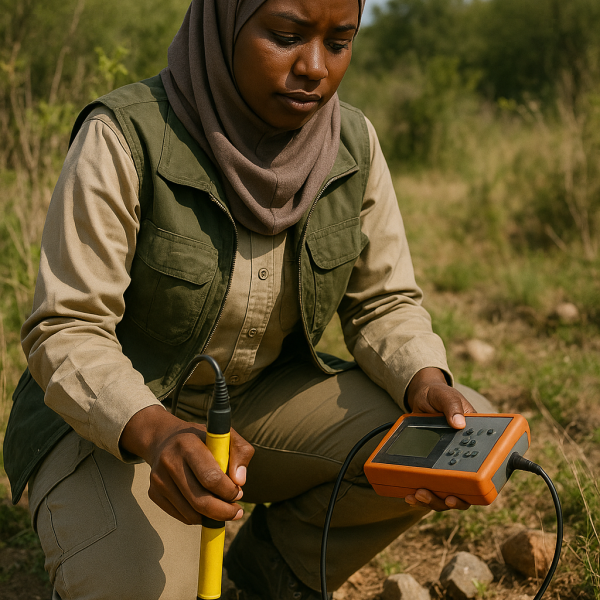
Environmental and Geophysical Field Specialist
Meet Our Departmental Staff
Start Your Journey in Physics Today!
Unlock exciting opportunities in energy, electronics, research, and innovation. At ADSU’s Department of Pure & Applied Physics, we’ll help you build the knowledge and skills to shape the future.



